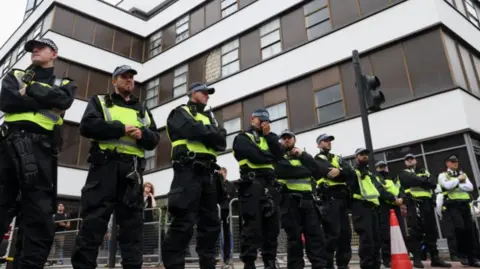The recent situation involving protests outside asylum seeker hotels in England has raised significant concerns about public order and community relations. On August 2, 2025, it was reported that a total of fifteen individuals were arrested amidst these protests, which conveyed a mix of anti-migrant sentiments and counter-demonstrations. According to law enforcement, nine of those arrests occurred in London, primarily due to violations of the Public Order Act.
The protests have emerged in various cities, with notable confrontations taking place in London and Newcastle, as well as a large march that was organized in Manchester. The events have sparked tensions between supporters of anti-immigration groups and counter-demonstrators, highlighting the sharp divide in public opinion regarding asylum policies and immigration in general.
The Home Secretary, Yvette Cooper, has responded to the unrest by expressing a desire to “restore order and control” over the current asylum system. In an interview published in the Sunday Times, she discussed her plans to introduce expedited procedures for asylum appeals. According to her projections, these changes are scheduled to take place in autumn, which she believes will aid in reducing the overall number of asylum claims in the country. Additionally, she underscored that increasing the rate of deportations and reducing processing times could contribute substantially to alleviating the burden on the country’s asylum system.
The issue of accommodation for asylum seekers has stirred public ire, as reflected by the noticeable drop in hotels being utilized for housing these individuals, plummeting from over 400 in the summer of 2023 to fewer than 210 now. While the government has announced an ambitious proposal to phase out the use of hotels as accommodations for migrants by 2029, critics argue that immediate measures must be taken to address the underlying causes of public discontent.
The protests, which have occurred over the past few weeks, have taken various forms, with one significant demonstration held outside the Thistle City Barbican Hotel in London’s Islington neighborhood. This protest featured counter-protesters from the organization Stand Up To Racism. Interestingly, while local residents purportedly organized the protest under the banner “Thistle Barbican needs to go – locals say no,” it was highlighted that endorsements from external groups might have contributed to escalating attendance.
Prominent figures like Jeremy Corbyn, the former Labour Party leader and current MP for Islington North, have publicly encouraged participation in counter-protests, further demonstrating the political undertones of the ongoing events. The Metropolitan Police implemented specific restrictions to manage the situation, defining zones for the opposing groups to minimize potential clashes.
Meanwhile, another protest in Newcastle took place outside The New Bridge Hotel, leading to four arrests, reflecting the contentious nature of these gatherings. Northumbria Police emphasized their commitment to upholding the right to lawful protest, yet maintained a firm stance against criminal activity associated with such demonstrations.
The escalation of tensions was not unique to London and Newcastle; in Manchester, a rally organized by the Britain First group attracted approximately 1,500 participants marching to the Central Library, where they gathered for speeches. Concurrently, a counter-demonstration led by Stand Up To Racism saw around 250 attendees. Police worked diligently to keep the two factions separated, demonstrating the potentially volatile situation and the need for careful management.
Although Greater Manchester Police reported that many demonstrations transpired peacefully, there were instances of disruption, including two arrests at the initiation of the Manchester march—one for theft and another for obstructing an arrest. These events emphasize the intricate balance between the right to protest and the need for public safety, a challenge that authorities are clearly grappling with as protests involving asylum seekers continue to unfold across various cities in England.












